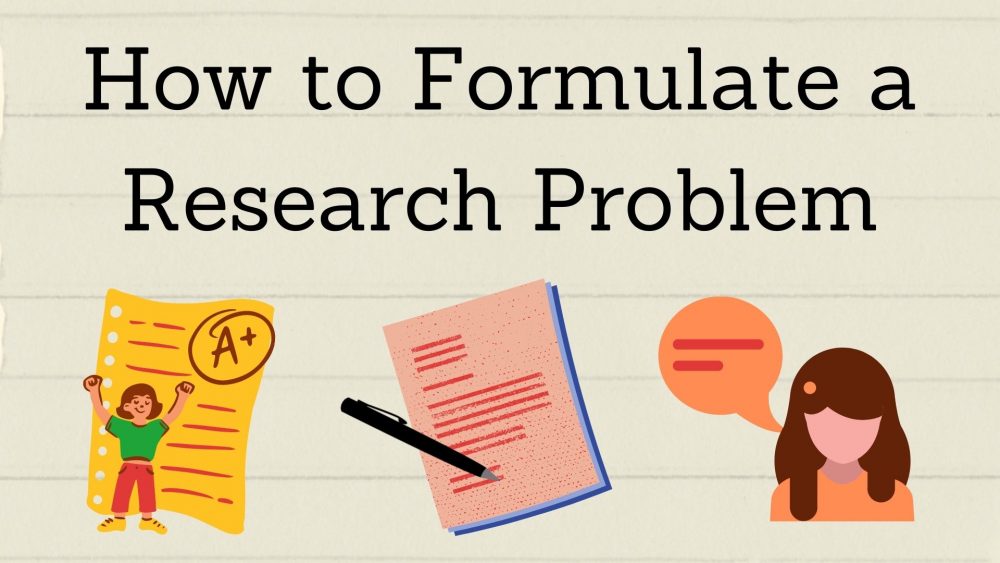Formulating a research problem is the first step of the research process. That’s because this is the issue that will guide your entire research work. You can’t solve an unknown problem. And solving a problem is the core aim of every research. Thus, a problem forms the basis of every study. If you formulate your study problem correctly, you will achieve better results and the ultimate aim of your research. This article explains the process of preparing a study problem.
What is a Research Problem?
A common question that most students ask when starting to write academic papers and essays is, “what is research problem?”
This research problem definition indicates that the expression can be practical and focused on contributing to a particular change or expanding knowledge. While some studies can do both, a problem can only do one. Therefore, your choice of a study research problem should depend on your interest area, topic, and research type.
Essentially, the research statement serves the following purposes:
- It introduces the importance of your study topic to the reader. This statement orients the readers to the significance of your study and the hypothesis or research questions that follow.
- It puts the problem into context. This expression defines your topic’s parameters by telling the audience what you will investigate.
- It creates the results’ reporting framework while indicating what you probably need for the study. It also explains how you will present the information in your findings.
How to Identify Problem in Research
Once you’ve selected an academic paper’s topic, the next step is staying a study problem that identifies the issues you intend to address. Formulating this expression is not always easy. Thus, some learners spend a lot of their precious time exploring, thinking, and studying before deciding on the problem to answer.
A research topic can also be too broad to provide a researchable issue. For instance, child poverty and other social issues might not give you a researchable question. That’s because they are general issues for a learner to address. Thus, researching such matters requires a lot of resources and time. Therefore, they are unfeasible for a study, and a paper about any of such issues will lack depth and focus.
How Do You State a Research Problem?
Stating a study problem will influence the success of your paper. You can generate several researchable issues from one subject. That’s because a single topic can have many arising issues. However, your study should focus on a single point on your preferred subject.
Here are the essential traits of a study problem:
- It reflects on critical needs or issues
- It has factual evidence, not hypothetical, as its basis
- It’s relevant and manageable
- It suggests a meaningful and testable hypothesis, not useless answers
Your research topic should be interesting for you to have things to tell the audience about it. However, that’s not the sole thing that makes it suitable for your academic research. You also need a well-defined study problem, without which you will have an unmanageable and unfocused project.
Essentially, your study could be a repetition of what other people have said in their work. You might also try to say many things or conduct a study without justification or purpose. As such, you need a study problem to engage in a study that will contribute relevant and new insights into your field.
Whether planning a thesis, a research paper, or a proposal, formulating a study problem will enable you to decide what to do and the reason for it. That’s because it states your intention to address the existing situation. Ideally, the goal is not only finding a conclusion solution. Instead, it’s to seek out reasons for the problem and suggest practical approaches for understanding or tackling it.
How to Formulate a Research Problem
To ensure that the audience knows your study’s purpose, start by formulating the problem. What’s more, this statement guides you from the beginning to the end of the research and writing process. Therefore, develop a study problem that focuses your research on providing valuable and relevant data. Essentially, a problem statement is an essential and effective tool for keeping you on track. But how do you write a research problem? Here are the steps to follow when formulating a study problem.
- Specify Your Study Objectives
Your problem statement should define the objectives of your study. That way, you can use it as your guide for conducting and developing meaningful and practical research. Research objectives should be manageable to ensure a relevant study. What’s more, this statement should help the audience or the professor evaluate the questions you want to answer with a research problem. It should also explain the methods you will use to address the questions.
- Review the Environment or Context of Your Research
For your research project to be successful, take your time to test and define all possible environmental variables. That way, you can determine whether your study findings will deliver sufficient data that’s worth consideration. Therefore, identify ecological variables that can affect your study and then formulate effective control methods for all of them.
- Determine the Nature of Your Study Problem
A study problem can be complex or straightforward. It can be anything, depending on the variables. For instance, a problem can be directly relevant to a specific study question. Another one can be unimportant for a project. Understanding your study problem’s nature enables you to find practical solutions. Therefore, understand all dimensions when stating a research problem. Think about all relevant details, including your focus groups. That way, you will get the necessary insights into your study questions.
- Determine How Variables Relate
Social, scientific, and other studies focus on establishing a repeating behaviors’ sequence over time. Completing a process involves:
- The identification of variables that may affect potential solutions to your study problem
- Deciding on the level to which you can control or use them for purposes of your study
- Establishing functional relationships among variables
- Selecting essential variables for your study problem’s solution
- Consider and develop several potential variable relationships at the formulation stage.
- Research Problem’s Structure
At this stage, check as many researchable problem examples as possible. That way, you can notice or understand how to structure a study problem. A good problem will enable you to determine the quality of your findings, methods, and answers. Quantitative designs employ deductive reasoning in stating a testable hypothesis. On the other hand, qualitative techniques use inductive reasoning to create a strong thesis statement.
Tips for Guiding Your Problem Formulation Process
As hinted, you should formulate the study problem at the beginning of the study or scientific process. However, your formulation process should start with a preliminary investigation of the topic. That means checking literature reviews, previous experiments, and research can provide hints into vague interest areas. Thus, you don’t select a research problem without a clue about the topic.
Instead, check areas with exciting results. Also, choose a field with exploration potential. You can review a successful experiment by disagreeing with the results, tests, methodology and then defining the process or even retesting the hypothesis. Ideally, you can read several research papers for hints on how to formulate, structure, and present your study problem. Here are more tips for developing a practical study problem.
- Revise Your Study Problem
Before using a study problem, get feedback from colleagues, teachers, and other people. Some people might tell you that your problem is very broad or difficult to understand. However, you’re the one to decide whether to use the statement as it is or revise it. Write the final, formal version after editing it based on the feedback from friends, teachers, and other people.
- Determine Whether the Study Problem Is Good
You can self-test the problem to determine whether it’s sufficiently suitable for your project. Ensure the following before proceeding with the study problem:
- It allows you to provide several potential answers
- It’s flexible, open-ended, and testable
- You can address it with sufficient evidence
- You can break it into several resolvable parts
- It’s clear and precise
- The premise is explicit
- It allows you to explain the importance of your solutions
- It’s ideal for your paper’s length
- It doesn’t include vague terms requiring definitions
- Check the Qualities of the Formal Version
You will need to check an example of research problem once in a while during the formulation process. That way, you will know how to create a practical study problem. However, the final version of the study problem should attract attention after classroom discussions or general reading. Here are the qualities that your study problem should exhibit.
- Relevancy
- Interesting
- Focused and specific
- Researchable
An ideal study problem has sufficient bearing on the topic. It also sticks to the limits set by the professor. Selecting an intriguing subject will motivate you. However, your subject shouldn’t be very broad or vague. If the educator assigns you a general research question, focus on specific aspects, events, or periods. Essentially, you should not have more than a few potential answers.
Also, get insights into the available materials. For instance, you can visit your academic and local libraries to check the updated and relevant databases, magazines, journals, books, and other information sources. In the beginning, a study problem can seem doable. However, your preliminary research will help you test it to determine whether you can find sufficient data.
Get Professional Assistance- Why Hire Expert Writers?
Using the above tips and methods can enable you to formulate a study problem for any project. What’s more, you can use a research problem example to determine the structure of this statement. However, you can have difficulties formulating a practical problem if the educator sets complex limits for you. You can also lack sufficient skills or time to compose your study problem. In that case, you need professional assistance to come up with a practical study problem.
Hiring professional writers will enable you to develop a practical problem to focus on answering in your research. That’s because these experts have the necessary skills, knowledge, and experienced to provide quality academic writing help. With their assistance, you will score high grades and excel academically after submitting your paper. What’s more, the best experts charge affordable prices. That means you don’t have to spend a lot of money to get professional assistance with your study problem.












